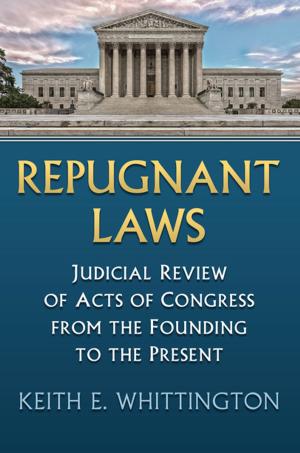Congress
Protecting Individual Rights
Nonfiction, Social & Cultural Studies, Political Science, Government| Author: | Louis Fisher | ISBN: | 9780700622122 |
| Publisher: | University Press of Kansas | Publication: | February 29, 2016 |
| Imprint: | University Press of Kansas | Language: | English |
| Author: | Louis Fisher |
| ISBN: | 9780700622122 |
| Publisher: | University Press of Kansas |
| Publication: | February 29, 2016 |
| Imprint: | University Press of Kansas |
| Language: | English |
When asked which branch of government protects citizens’ rights, we tend to think of the Supreme Court—stepping in to defend gay rights, for example, in the recent same-sex marriage case. But as constitutional scholar Louis Fisher reveals in his new book, this would be a mistake—and not just because a decision like the gay marriage ruling can be decided by the opinion of a single justice. Rather, we tend to judge the executive and judicial branches idealistically, while taking a more realistic view of the legislative, with its necessarily messier and more transparent workings. In Congress, Fisher highlights these biases as he measures the record of the three branches in protecting individual rights--and finds that Congress, far more than the president or the Supreme Court, has defended the rights of blacks, women, children, Native Americans, and religious liberty.
After reviewing the constitutional principles that apply to all three branches of government, Fisher conducts us through a history of struggles over individual rights, showing how the court has frequently failed at many critical junctures where Congress has acted to protect rights. He identifies changes in the balance of power over time—a post-World War II transformation that has undermined the system of checks and balances the Framers designed to protect individuals in their aspiration for self-government. Without a strong, independent Congress, this book reminds us, our system would operate with two elected officers in the executive branch and none in the judiciary, a form of government best described as elitist—and one no one would deem democratic.
In light of the history that unfolds here—and in view of a Congress widely decried as dysfunctional—Fisher proposes reforms that would strengthen not only the legislative branch’s role in protecting individual rights under the Constitution, but also its standing in the democracy it serves.
When asked which branch of government protects citizens’ rights, we tend to think of the Supreme Court—stepping in to defend gay rights, for example, in the recent same-sex marriage case. But as constitutional scholar Louis Fisher reveals in his new book, this would be a mistake—and not just because a decision like the gay marriage ruling can be decided by the opinion of a single justice. Rather, we tend to judge the executive and judicial branches idealistically, while taking a more realistic view of the legislative, with its necessarily messier and more transparent workings. In Congress, Fisher highlights these biases as he measures the record of the three branches in protecting individual rights--and finds that Congress, far more than the president or the Supreme Court, has defended the rights of blacks, women, children, Native Americans, and religious liberty.
After reviewing the constitutional principles that apply to all three branches of government, Fisher conducts us through a history of struggles over individual rights, showing how the court has frequently failed at many critical junctures where Congress has acted to protect rights. He identifies changes in the balance of power over time—a post-World War II transformation that has undermined the system of checks and balances the Framers designed to protect individuals in their aspiration for self-government. Without a strong, independent Congress, this book reminds us, our system would operate with two elected officers in the executive branch and none in the judiciary, a form of government best described as elitist—and one no one would deem democratic.
In light of the history that unfolds here—and in view of a Congress widely decried as dysfunctional—Fisher proposes reforms that would strengthen not only the legislative branch’s role in protecting individual rights under the Constitution, but also its standing in the democracy it serves.















